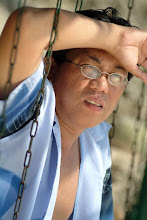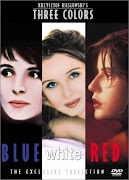 JULES AND JIM. About loving and living like death is a joke, one can’t experience a more effervescent film than this one-of-a-kind menage-a-trois that’s also valentine to friendship and reading. Directed by Francois Truffaut, this ode-worthy adaptation from Henri-Pierre Roché’s novel is way up there in my all-time top 40 list of personal favorites (aside from another Truffaut wonder, “The 400 Blows”).
JULES AND JIM. About loving and living like death is a joke, one can’t experience a more effervescent film than this one-of-a-kind menage-a-trois that’s also valentine to friendship and reading. Directed by Francois Truffaut, this ode-worthy adaptation from Henri-Pierre Roché’s novel is way up there in my all-time top 40 list of personal favorites (aside from another Truffaut wonder, “The 400 Blows”).The film explores the 30-year friendship—from the bohemian pre-World War I Paris to its doomed aftermath--between a French writer and an Austrian biologist as well as the ensuing love triangle with Catherine (in a sensually enigmatic performance by Jeanne Moreau). A feather in the cap of the French New Wave, this film is celebratory as it captures the devil-may-care days of youth—with a bacchanalia of details—matched with the panache of its zooms, flash cuts, freeze frames, etc.--that deftly reflect the changes in the relationship up to the postwar years.
 INTOLERANCE. “Quite the most marvelous thing which has been put on the screen,” pipes in a celluloid scholar.
INTOLERANCE. “Quite the most marvelous thing which has been put on the screen,” pipes in a celluloid scholar.Living up to D.W. Griffith’s epithet as the silent era's "king of the world," this is the epitome, indeed, of an epic. Staggering is the scope of its vision and its narrative ambition as Griffith interweaves a quartet of parallel stories set in different historical periods: the modern 1916 when a workers' strike was brewing up, Jerusalem circa Christ's crucifixion, 1572 when Paris stewed with Catholic persecution against the Protestant Huguenots, and ancient Babylon. It’s nothing short of miraculous how the four stories accelerate into a common ground in its climactic race against time to save an innocent young man from the gallows. Literally heavenly, too, is the visual epilogue—a swarm of angels floating over a battlefield—a hallucination of a wished-for world without fear, ignorance, hatred, intolerance.
No wonder, the prize-winning and most controversial film critic Pauline Kael raved about it outright as the “greatest movie ever made.”
 TOKYO STORY. How does a bomb buried in one’s heart feel? Find out with this restraint but emotionally explosive cache of insight by Yasujiro Ozu. Into the booby-trapped terrain of parent-children relationship—with its architectonics of tenderness and ache—Ozu dwells and delivers his stylistic signature: shots of nature undercutting and overlapping the story, the “tatami” mat angle, the stillness of his shots, and his characters speaking directly into the camera (compelling the viewer into intimacy).
TOKYO STORY. How does a bomb buried in one’s heart feel? Find out with this restraint but emotionally explosive cache of insight by Yasujiro Ozu. Into the booby-trapped terrain of parent-children relationship—with its architectonics of tenderness and ache—Ozu dwells and delivers his stylistic signature: shots of nature undercutting and overlapping the story, the “tatami” mat angle, the stillness of his shots, and his characters speaking directly into the camera (compelling the viewer into intimacy).Simplicity is beauty. True enough, this film hooks the heartstring tight into the plight of an aging couple on the road from their rural village to visit their two married kids in the city. What follows wrenches the guts without the fluffs and frills of sentimentality through the quintessentially Japanese yet universal theme of generation gap. So much so that a character’s comment (“One cannot serve his parents from beyond the grave") resonates with the crack of a rock under the weight of a teardrop. One of my top all-time favorites, definitely.
 STORY OF WOMEN. Morality is a matter best left for God’s infinite grace, but its complexity is what director Claude Chabrol mirrors with utter complexity and unflinching humanity—warts and all—in this cinematic coup.
STORY OF WOMEN. Morality is a matter best left for God’s infinite grace, but its complexity is what director Claude Chabrol mirrors with utter complexity and unflinching humanity—warts and all—in this cinematic coup.Based on the last woman to be executed in France, a housewife guillotined for performing abortions and housing prostitutes in Nazi-occupied France during World War II, the film dares to see a side of war rarely depicted: the lives in the margins of battle, no less caught in the crossfire between good and evil.
Exquisite as always is Isabelle Huppert, declared Best Actress at the Venice Film Festival for the layered and quilt-worthy quality of her characterization: at once sly and naïve, vulture-like and vulnerable.
 COMEDY OF POWER. Probably one of the most fecund of filmic collaboration in world cinema (aside from Akira Kurosawa and Toshiro Mifune, Zhang Yimou and Gong Li, Mario O’Hara and Nora Aunor), Claude Chabrol and Isabelle Huppert score once more in this political thriller.
COMEDY OF POWER. Probably one of the most fecund of filmic collaboration in world cinema (aside from Akira Kurosawa and Toshiro Mifune, Zhang Yimou and Gong Li, Mario O’Hara and Nora Aunor), Claude Chabrol and Isabelle Huppert score once more in this political thriller.Inspired by a real-life scandal involving a French business empire and several top-level politicians, this film is tongue-in-cheek with its timely and provocative account of corporate and political rot. Huppert packs a knockout performance as a feisty magistrate, called "the piranha" in the judiciary system for her almost ravenous appetite for white-collar criminals in high places even as her domestic life languishes in the shallows.
Zooming into a world darkened by the monstrosity of power with its spawn of threat and intimidation, Chabrol is also light-handed at squeezing out humor as privilege paves the way for shadowy characters to lose face and fumble into disgrace.
 THE CIRCLE. Smuggled out of Iran for the Venice Film Festival where it won the Golden Lion Award for Best Film, this daredevil work by Jafar Panahi roars with rage against a claustrophobic political culture.
THE CIRCLE. Smuggled out of Iran for the Venice Film Festival where it won the Golden Lion Award for Best Film, this daredevil work by Jafar Panahi roars with rage against a claustrophobic political culture.Despite the pall of repression and injustice that hangs over the chador of a chain of women burdened by their gender, Panahi casts a spell of compassion as he showcases the rage and resilience of each character, scraping for goodness and dignity while scurrying through streets like rats to evade arrest.
From the opening scene at a delivery room and final moment in the dungeon, Panahi’s camera bears witness to the wonder of each woman’s spunk in spite of their common nightmare.
 MAMMA ROMA. Stirring a critical stew against post-war Italian society and peppering it with dollops of neorealism, Pier Paolo Pasolini demonstrates how cinematic art can pack artillery for his anti-Fascist ideology.
MAMMA ROMA. Stirring a critical stew against post-war Italian society and peppering it with dollops of neorealism, Pier Paolo Pasolini demonstrates how cinematic art can pack artillery for his anti-Fascist ideology.Outrage becomes this film with the fiery Anna Magnani in the lead role as a former whore struggling to steer away from her past for the sake of her estranged teenage son.
But a better life with her child and her petit bourgeois idealism haplessly goes against the grain of Pasolini's worldview, whittling her dreams to the dimension of a tragic opera.
Like most of Pasolini's films, Mamma Roma was grist for controversy, but it was nothing compared to the outcry over La Ricotta, a 35-minute short featuring Orson Welles included in this DVD. Seized and condemned "for insulting the religion of the state," La Ricotta is a subtle but droll thumb-down at the Catholic Church with its story of a director (Welles) filming the crucifixion of Christ in which the actor playing Jesus stuffs himself with ricotta cheese and dies from indigestion on the cross!
 THE MAGDALENE SISTERS. From acclaimed director Peter Mullan comes an incendiary testimony to one of the great tragedies of our time: an unflinching account of life inside the Magdalene Laundry, one of the asylums for "wayward women" run by the Catholic Church in Ireland under the mercy, or the lack thereof, of sadistic nuns. Stripped of their dignity and condemned to indefinite sentences of manual labor in order to cleanse themselves of the "sins," the women have become outcasts of society and spurned by their families.
THE MAGDALENE SISTERS. From acclaimed director Peter Mullan comes an incendiary testimony to one of the great tragedies of our time: an unflinching account of life inside the Magdalene Laundry, one of the asylums for "wayward women" run by the Catholic Church in Ireland under the mercy, or the lack thereof, of sadistic nuns. Stripped of their dignity and condemned to indefinite sentences of manual labor in order to cleanse themselves of the "sins," the women have become outcasts of society and spurned by their families.In the face of hell, Mullan’s camera—basking in the perspective of three young inmates—also lays bare and celebrates their indomitable will and defiance that pave the way for the closure of a repressive establishment. Righting a wrong is never a cliché in Mullan’s hand as this gripping film went on to garner the top prize at the Venice Film Festival.
 L’AVVENTURA. Hailed by many as Michelangelo Antonioni’s masterpiece, L’Avventura is veritably a voyage of discovery, not only for its characters but also for its viewers bracing for a film’s function as a moral mirror and a visual poem.
L’AVVENTURA. Hailed by many as Michelangelo Antonioni’s masterpiece, L’Avventura is veritably a voyage of discovery, not only for its characters but also for its viewers bracing for a film’s function as a moral mirror and a visual poem.A milestone in motion-picture grammar, film scholars call it. What appears to be a search for a missing person in a rocky island is actually an exploration of spiritual alienation and an understated diatribe against the decadence of idle upper class and their superficial notions on love and happiness.
Symbolic resonance is what Antonioni luxuriates in this tale of a girl who mysteriously disappears on a yachting trip. While her lover and her best friend search for her, they begin an affair. Eschewing smooth plotting, Antonioni revels instead in the power of symbols and uncanny character development. Something that grows like second skin with each repeat viewing.
 CAMILLE CLAUDEL. Obsession with art and its intimacy with insanity. Thus this riveting film renders the life of Camille Claudel, the prodigy-muse-lover of sculptor Auguste Rodin who later became her competitor en route to her fall from grace.
CAMILLE CLAUDEL. Obsession with art and its intimacy with insanity. Thus this riveting film renders the life of Camille Claudel, the prodigy-muse-lover of sculptor Auguste Rodin who later became her competitor en route to her fall from grace. Isabelle Adjani is incandescent in the title role opposite the great Gerard Depardieu in this historically accurate depiction of one of the most important union in the history of modern art.
The film begins with Camille braving the winter and digging clay with bare fingers from a frozen ditch. In the end, with her being hauled to an asylum, the viewer is left asking regarding the cause of Claudel's madness. Was it genes, or her reaction against society's mores, or the product of Rodin's persecution? Or, as one exasperated family member reckons, was it "the madness of mud"?
(Next in my viewing list: L'Atalante, Twilight Samurai, A Streetcard Named Desire, The Remains of the Day, Hannah and Her Sisters, Coup de Tourchon, Face, Army of Shadows, After Life, and Lilies of the Field.)

























































No comments:
Post a Comment